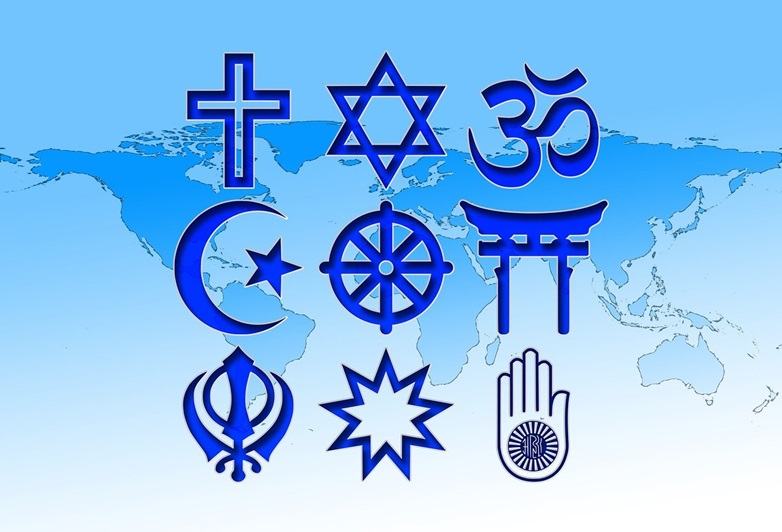World Religion Day is on its way. How should (or shouldn’t) your faith group reach out to people of other religions?

Every year on the third Sunday of January, World Religion Day promotes communication and friendship between people of different faiths. In this article, I’ll discuss how not to reach out to other religious groups. Then, I’ll give seven suggestions for productive interfaith relationships.
Pretty Horrible, In Retrospect
The Messianic Student Alliance
Loosely tied to a local Messianic Jewish congregation, the Messianic Student Alliance (MSA) existed for three purposes.
- To love Jewish people.
- To help Christian students gain an appreciation for the Jewish roots of Christianity.
- To share the love of Jesus by evangelizing Jewish students on campus.
To further our goals, we met regularly to discuss the Jewish prophecies that Jesus fulfilled. We studied the Jewish history of Christianity. Some of us availed ourselves of courses on Hebrew scripture, Jewish history, and Jewish philosophy from the university’s religious studies department. To fully comprehend our religion’s own culpability, we made ourselves aware of the Christian tradition of anti-Semitism from earliest times. And yet, we didn’t understand the antisemitism inherent in our organization’s stated purpose.
Why the MSA was Antisemitic
Although the purpose statement claimed love for Jewish people, the MSA’s purpose statement gave evidence to its antisemitism. It is inherently anti-Semitic for a Christian organization to target Jewish people for evangelization. Here are three reasons why:
- It promotes the idea that Judaism is deficient and that Christianity is superior.
- It seeks to eliminate Judaism by converting all Jews and subsuming Judaism into Christianity.
- It imagines that the Jewish God would damn the majority of Jewish (ostensibly the “chosen”) people to hell. (If you believe in a God who evidently hates Jewish people enough to burn them forever, this becomes a justification for such atrocities as the holocaust.)
Don’t get me wrong—I don’t think that members of the MSA were overtly antisemitic. That is, if our only definition of antisemitism is wishing harm on Jewish people. We all believed that we were loving Jewish people by seeking their conversion. In fact, we thought that Messianic Judaism was the ultimate fulfillment of Judaism. We thought we were helping—and we didn’t understand how our attitudes were insulting at best, and harmful at worst. What we needed to learn was that doing anything that even inadvertently harms the Jewish people is antisemitic—even if we thought our motives were love.
We Love You, But We Want to Change You
We said that we loved the Jewish people so much that we wanted to help them know Jesus (Yeshua) as the Jewish Messiah. What we were really saying was, “We love you, but we want to change you. We don’t want you to be what you are. We want you to be what we are. Only when you become what we are will you be truly fulfilled.”
As a former Southern Baptist, I recall a denominational emphasis on evangelizing Jewish people. While it sounded nice to say that we loved our Jewish brothers and sisters enough to convert them, the opposite was in fact, true. If you love someone as they are, you don’t try to change them. And you certainly don’t get into relationships with people with the express purpose of trying to change them.
Southern Baptists are a missional people. When they use the word “missions,” the Southern Baptist Convention (SBC) emphasizes proselytizing people from other world religions. I remember one booklet I got years ago from the Virginia Baptist Mission Board, highlighting the main theological points of the major world religions. Instead of focusing on objective statements of doctrinal beliefs and religious practices, the brochure concentrated on talking points to convert people of other faiths. For the SBC, the purpose of learning another religion is to find weaknesses and vulnerabilities to attack in interreligious debate. How much better would it be to focus on learning other religions to make friends and seek understanding?
World Religion Day: Why Outreach Shouldn’t Mean Evangelism
World Religion Day is January 21. It’s a day centered on outreach without evangelism. This means making friends with people of other religions, with no purpose other than to share in their love and beauty. These days, I would never dream of telling someone from a different background that they need to abandon their faith tradition in exchange for mine. Neither would I have the arrogance to pretend that Christianity is the fulfillment of their tradition.
As a universalist, I now believe that all of God’s creatures are whole, complete, saved, and redeemed. In fact, the greatest sin (if one wants to use that word) is the notion that we are disconnected from God in the first place. For this reason, I no longer try to evangelize people of other faiths. Instead, I simply enjoy the relationship we can share as we learn from one another.
Sitting in the Shade of Another Tree
I was honored to be asked to contribute a chapter to the Patheos/QUOIR Book, Sitting in the Shade of Another Tree: What We Learn by Listening to Other Faiths. I hope you’ll pick up a copy and see the beauty of other cultures and religions. Here are seven suggestions for how you can rest in the shade of someone else’s tree:
- Reach beyond your own religious group to form genuine friendships.
- Focus more on listening to others than on sharing your own beliefs.
- Share your beliefs only when asked.
- Begin to think about your own religion as a set of practices to help you experience God, rather than a set of inviolable theological propositions that are at odds with others.
- Accept invitations to participate in worship services, festivals, meditations, and events from other faiths. No, you won’t go to hell for attending another religion’s services.
- Ask lots of questions—from a position of curiosity, not judgment.
- Adopt a position of humility regarding your own beliefs. Remember that yours is just one of many religions in the family tree of faith.
When we sit in the shade of someone else’s tree, we allow that relationship to nourish us. We soak in the beauty of their spiritual practices while continuing to honor our own. We refrain from competition and simply learn to enjoy one another. This World Religion Day, and throughout the year, I hope you’ll consider how you can pursue relationships with people of other faiths, without trying to evangelize them.














